Trying out new software takes a lot of time and focus. If you’re like me, each new tool brings the hope that it will meet your needs and fit smoothly into your work. But there’s nothing more frustrating than spending hours setting it up only to find it’s not quite right. With so many CRM portals out there, choosing one can feel overwhelming.
This article is here to save you some of that hassle by giving a quick look at some of the best CRM portals on the market. These tools help you manage client relationships, keep data organized, and improve communication—making it easier to focus on growing your business.
Whether you need something simple or packed with features, this guide covers seven CRM portals to try in 2025. By comparing their key features, strengths, and limitations, you’ll get a clearer idea of which CRM portal could be the best fit for your business.
What is a CRM Portal?
A CRM portal is an online platform designed to help businesses manage and nurture their customer relationships. It consolidates customer data, communication, and interactions in one place, giving teams an organized view of their client base. With a CRM portal, businesses can track customer interactions, manage tasks, and communicate more efficiently, all within a single, secure system.
CRM portals are often integrated with tools like email, project management software, and social media, making it easy for teams to stay connected without switching between multiple platforms. This not only saves time but also reduces errors and missed information, resulting in a smoother customer experience.
In addition to streamlining workflows, CRM portals often provide a personalized space where customers can access their own information, check for updates, and communicate with support teams. This transparency makes it easy for clients to stay informed and engaged, leading to better customer satisfaction.
Why a CRM Portal is Important for Your Business
Using a CRM portal can bring several key benefits to your business, helping to improve efficiency and strengthen customer relationships. Here are some of the main ways a CRM portal can make an impact:
Improved productivity
With all client information and communication in one place, teams spend less time searching for data and switching between apps. A CRM portal keeps everything streamlined and organized, allowing team members to focus on higher-value tasks.
Better customer interaction
CRM portals make it easy to track each client’s history and preferences, so every interaction is personalized. This helps teams build stronger relationships with clients by showing that they understand and care about each customer’s unique needs.
Faster communication
With real-time updates and centralized messaging, CRM portals make communication faster and more efficient. This means quicker response times, fewer missed messages, and better alignment between teams and clients.
All information in one place
A CRM portal centralizes customer data, contact history, project updates, and more. Instead of juggling spreadsheets or multiple tools, everything is accessible in a single platform, making information easier to manage and share.
Strong security
Customer data security is critical, and most CRM portals come with robust security features to protect sensitive information. With built-in access controls and data encryption, you can feel confident that your customers’ information is safe.
Helpful insights
Many CRM portals offer analytics and reporting features that provide insights into customer behavior and team performance. These insights can help you make data-driven decisions to improve service quality and business outcomes.
What Features Should You Look For in a CRM Portal?
When choosing a CRM portal, there are a few key features to keep in mind. Each business has unique needs, so it’s important to consider the options that will help you work more efficiently and grow your client relationships. Here are some essential features to look for:
Integration with other tools
A good CRM portal should integrate with the other software you use daily, such as email, project management tools, and calendars. This helps create a seamless workflow, eliminating the need to switch between different applications.
Customization features
Every business has its own processes, and a CRM portal should be flexible enough to adapt. Look for customization options that allow you to tailor workflows, data fields, and dashboards to fit your specific needs.
Security features
Customer data is sensitive, so a CRM portal should have strong security measures in place. Features like access controls, data encryption, and secure logins are essential to protect both your business and your clients.
Ease of use
A CRM portal should simplify your work, not make it harder. Look for a user-friendly design that’s easy for your team to learn and navigate, so you can get up and running with minimal training.
Accessibility
Your team should be able to access the CRM portal from any location or device, whether they’re in the office or on the go. Cloud-based options with mobile support make it easier to stay connected with clients wherever you are.
Scalability
As your business grows, your CRM portal should be able to grow with it. Look for scalable options that can handle an increasing number of clients, users, and data without slowing down or becoming overly complex.
Reporting and analytics
Analytics are essential for understanding customer trends and measuring team performance. Look for a CRM portal that offers reporting features to help you track key metrics, identify areas for improvement, and make informed decisions.
7 Best CRM Portals to Try in 2025
With so many CRM portals available, choosing the right one can be a challenge. Each tool has unique strengths, catering to different business needs and team sizes. In this guide, we’ll explore seven top CRM portals that offer powerful features to streamline client management, improve communication, and boost productivity. Whether you’re a freelancer or part of a large team, these platforms are worth considering to help you stay organized and connected with your clients.
1. Ahsuite
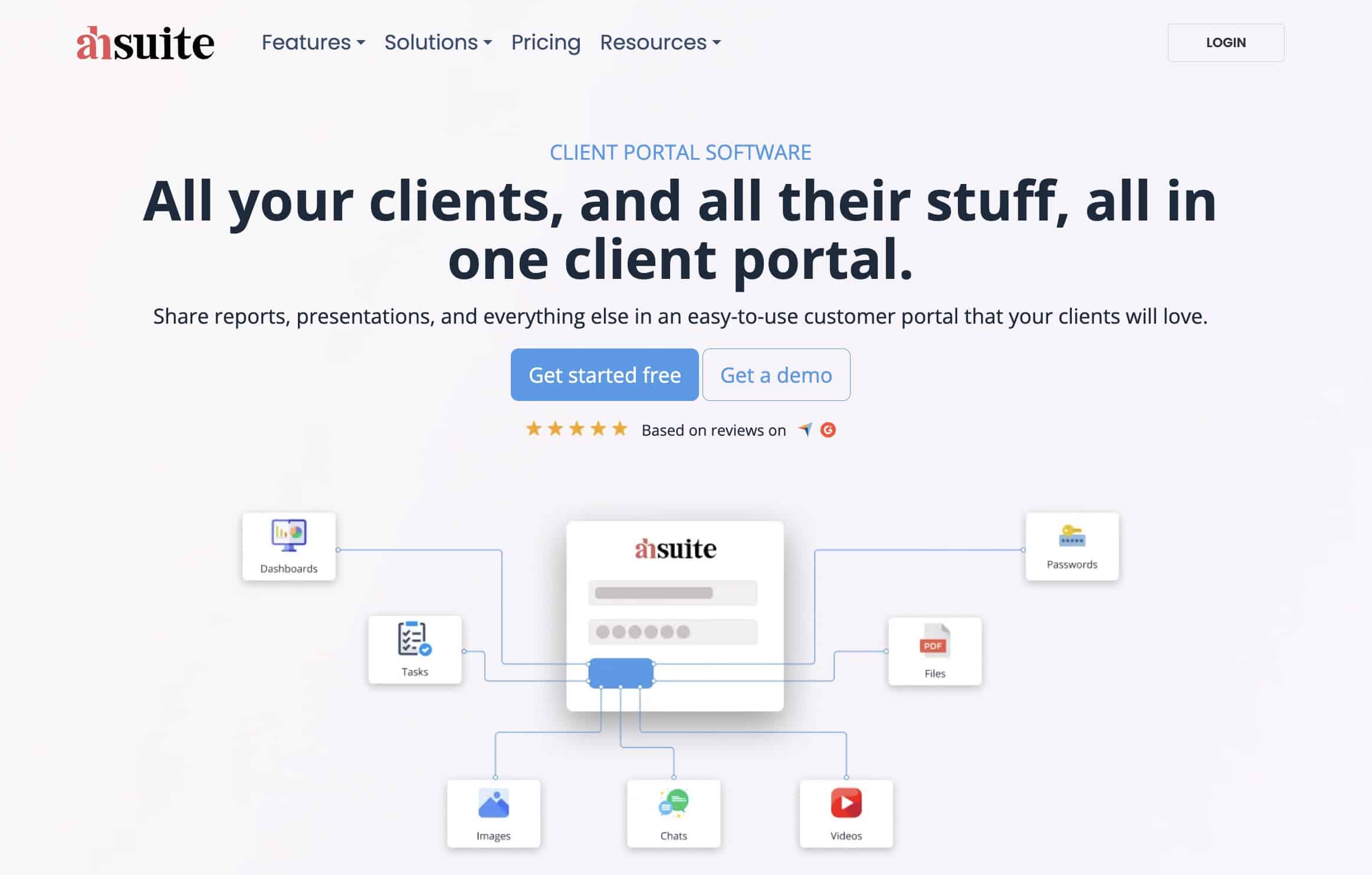
Ahsuite is more than just a client portal tool; it combines client portal functionality with CRM and productivity features, making it a versatile solution for freelancers, agencies, and small businesses. It allows users to create secure, organized portals where clients can access documents, dashboards, and project updates. With its easy-to-use interface, Ahsuite simplifies client interactions and reduces the need for support by giving clients a single location to find everything they need.
Beyond file sharing and project tracking, Ahsuite includes CRM features like task assignments, messaging, and team management. Although it doesn’t offer as many advanced CRM features as dedicated platforms, it excels in simplicity and usability, making it an ideal choice for teams that prioritize ease of use over complexity. Ahsuite’s minimalist design and built-in communication tools make it easy for users to guide clients through their tasks and stay aligned on project progress.
Ahsuite offers a free Starter plan, ideal for freelancers, which supports up to 10 portals. For growing teams, the Grow plan is available at $6.50 per month, while the Professional plan, with added features like a password manager and user network access, costs $14 per month. The Agency plan, at $24 per month, includes white-label options and custom domains, making it a valuable choice for teams looking to brand their client interactions. Ahsuite also offers a free trial for users to explore its features.
2. Microsoft Dynamics 365
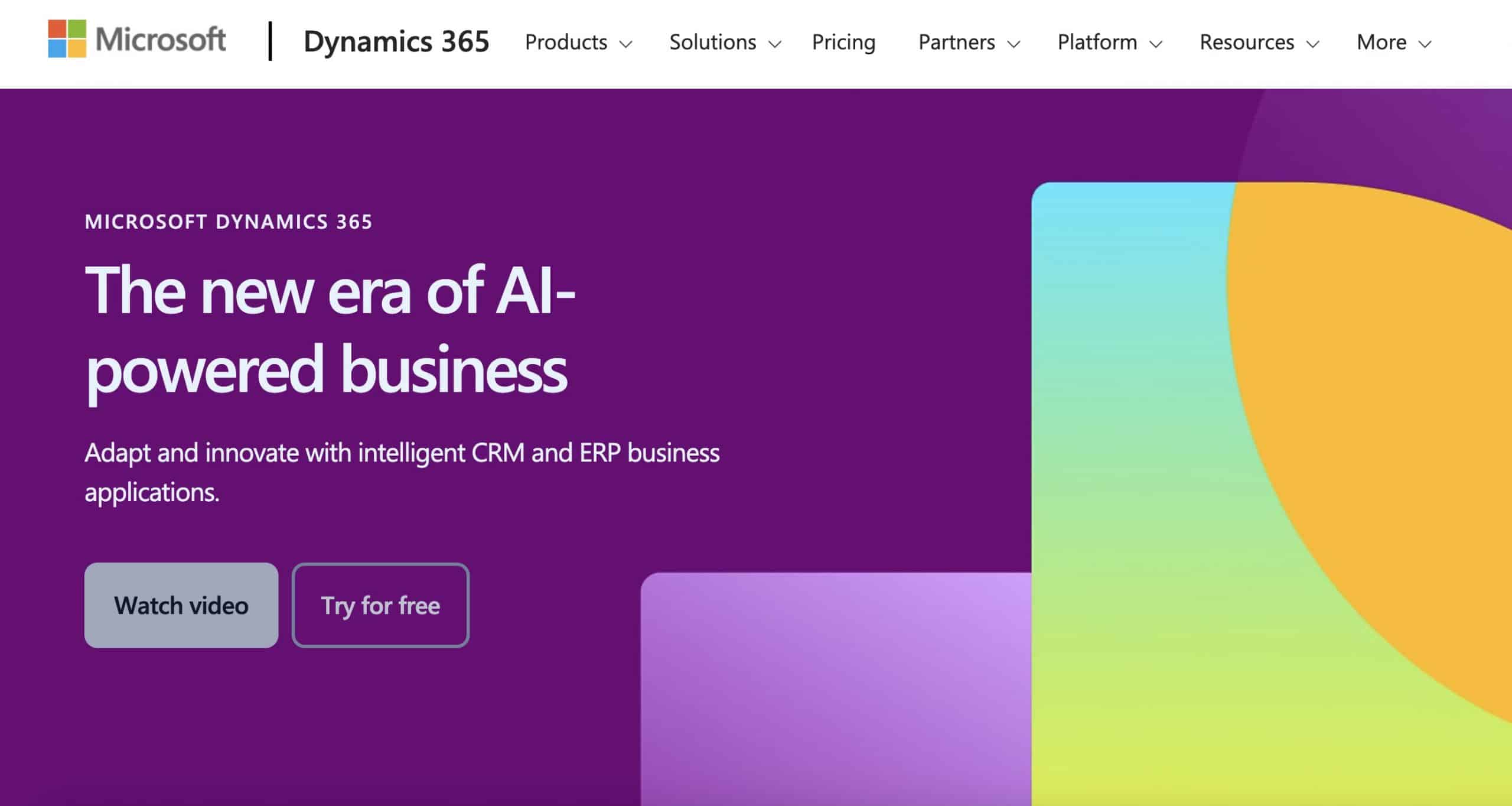
Microsoft Dynamics 365 Sales combines CRM and ERP capabilities to connect customer data, processes, and teams across an organization. This unified platform supports a variety of business applications—including sales, customer service, marketing, and field service—allowing teams to manage relationships, track customer interactions, and automate workflows. With Microsoft Copilot, Dynamics 365 brings built-in AI capabilities to help businesses analyze data, improve decision-making, and enhance customer experiences in real time.
One of the standout features of Dynamics 365 is its integration with other Microsoft products, like Microsoft 365 and Microsoft Teams, providing a cohesive, familiar environment for users. This integration streamlines communication and increases productivity by allowing teams to work within the tools they already use, with real-time insights at their fingertips. Additionally, Dynamics 365’s low-code customization options empower users to adjust processes and adapt the platform to fit their unique needs quickly and efficiently.
Microsoft Dynamics 365 Sales offers flexible pricing tiers, starting with the Sales Professional plan at $65 per user per month. The Sales Enterprise edition, which adds advanced AI features and customization options, is available at $105 per user per month, while the Sales Premium plan offers even deeper intelligence solutions for $150 per user per month. A free trial is available, allowing businesses to test these features before committing.
3. SuiteDash
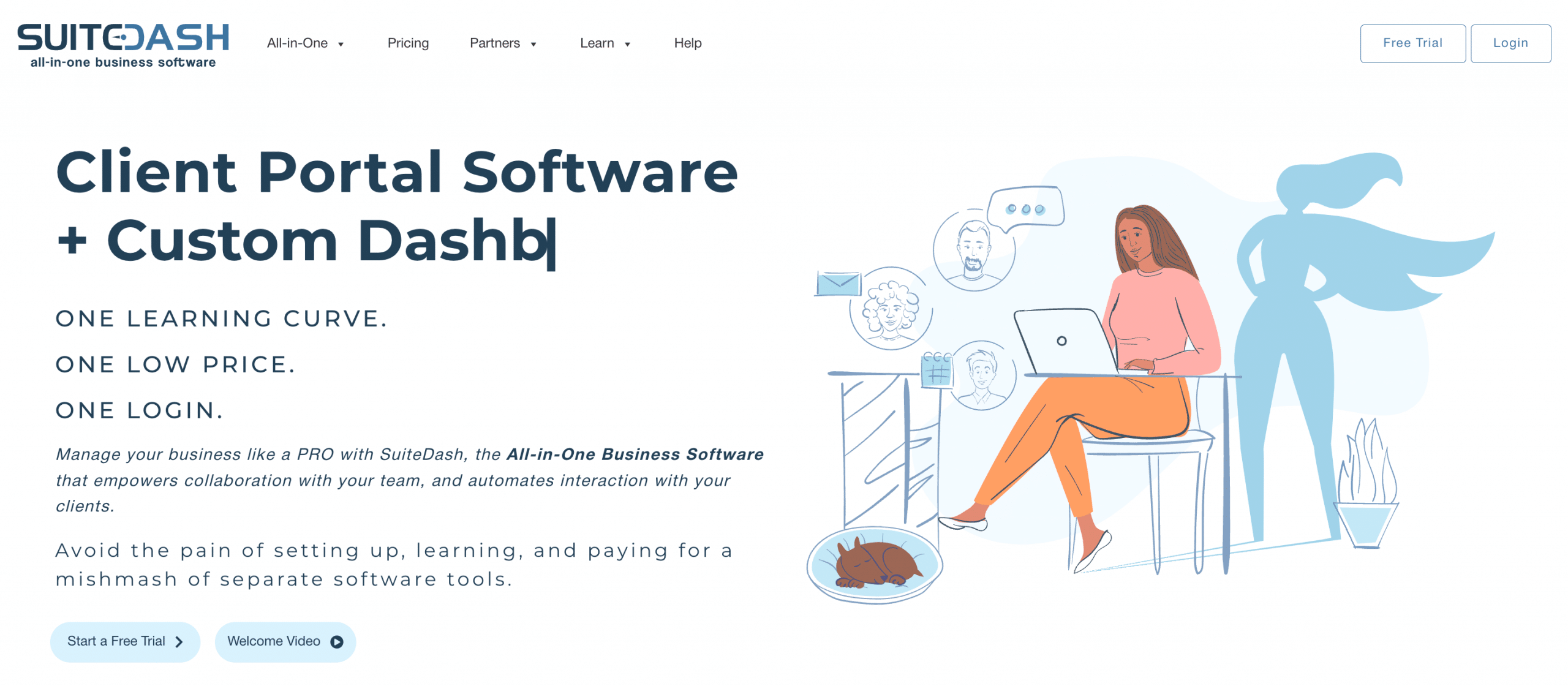
SuiteDash is an all-in-one business management platform designed for small to medium-sized businesses. It combines CRM functionality with client portal tools, enabling teams to manage client data, automate sales funnels, and streamline onboarding processes in one central platform. SuiteDash’s CRM includes automated lead generation and onboarding tools that allow businesses to customize client journeys and set up efficient workflows, making it easier to manage client relationships from first contact to project completion.
With SuiteDash, CRM capabilities extend to advanced project management, document sharing, and secure client messaging, creating a fully integrated experience that keeps all essential information in one place. The platform’s CRM Circles feature lets users customize client experiences based on predefined categories, which helps teams manage permissions, access, and communication for different client groups. SuiteDash’s focus on automation—through tools like Deal Stages Pipelines and automated follow-ups—enables sales and support teams to work proactively without needing to micromanage every step.
SuiteDash offers three pricing tiers with no per-user fees, starting with the “Start” plan at $19 per month for foundational CRM features. The “Thrive” plan, which adds advanced tools like drip marketing and proposal management, is available for $49 per month, while the top-tier “Pinnacle” plan includes complete automation features and 2TB of storage for $99 per month. SuiteDash also offers a 14-day free trial, which includes access to its highest-level features so users can fully explore the platform.
4. Jet Admin
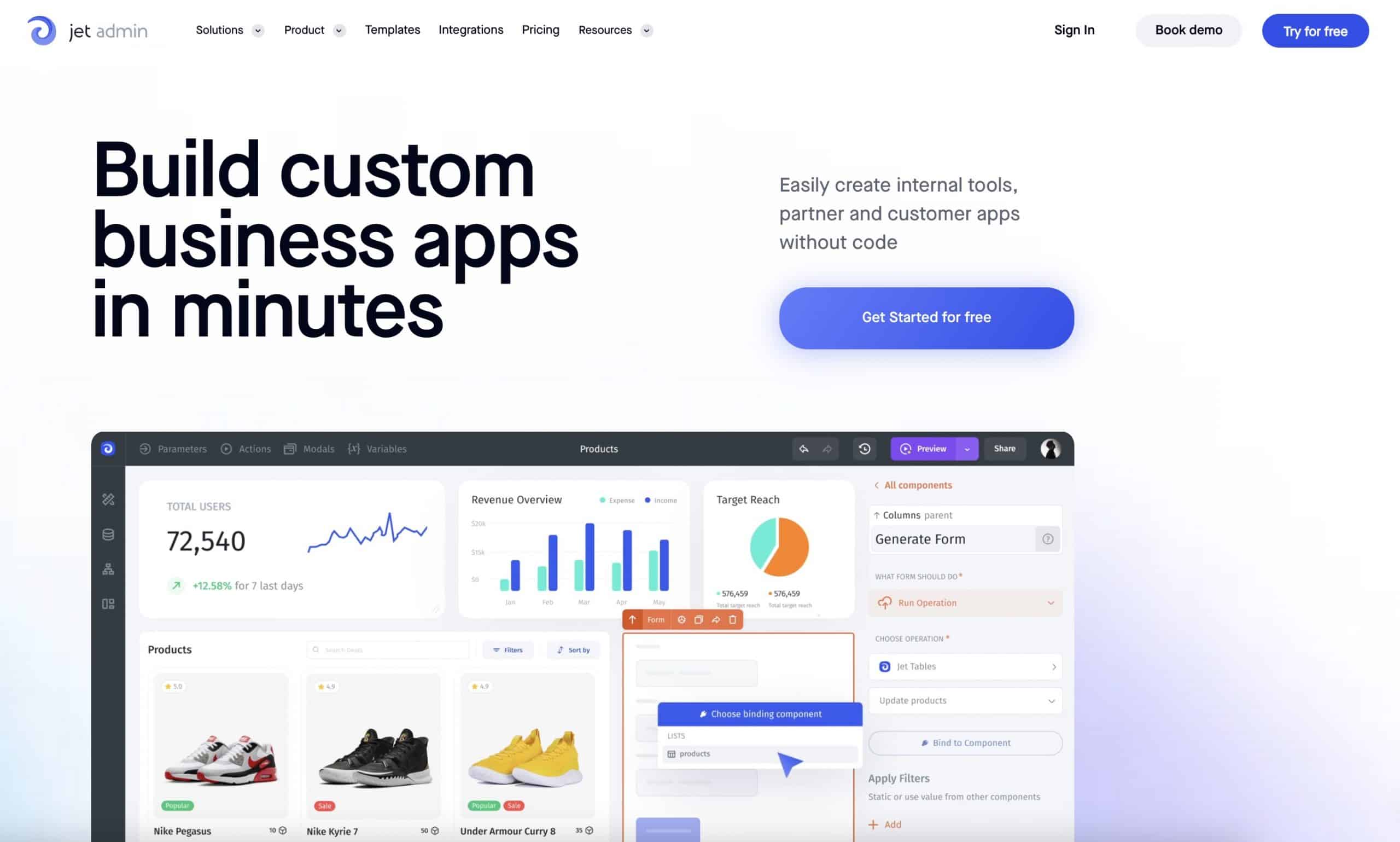
Jet Admin is a versatile platform that allows businesses to create customized CRM portals and client-facing apps without code. Designed with flexibility in mind, Jet Admin enables companies to connect and manage data from multiple sources in a centralized, secure portal. This CRM portal can include various features, such as client onboarding, data management, and role-based permissions, helping teams handle interactions with clients and partners more efficiently.
With its drag-and-drop interface, Jet Admin allows users to design and customize their portal’s interface, giving complete control over elements like styling, workflow automation, and access permissions. The platform also supports API integrations, SQL queries, and other backend connections, making it suitable for businesses with complex data requirements. This low-code solution allows teams to create portals that are both functional and tailored to specific business needs, reducing dependency on separate CRM or admin tools.
Jet Admin offers a variety of pricing plans, beginning with a Starter plan at $39 per month, which supports up to 500 users and includes core features like database integrations and unlimited workflows. The Pro plan, at $290 per month, adds features such as white labeling, custom domains, and API access, while the Enterprise plan, at $649 per month, includes advanced security options and dedicated support. Each plan comes with a 14-day free trial so users can test the platform’s features before committing.
5. Salesforce
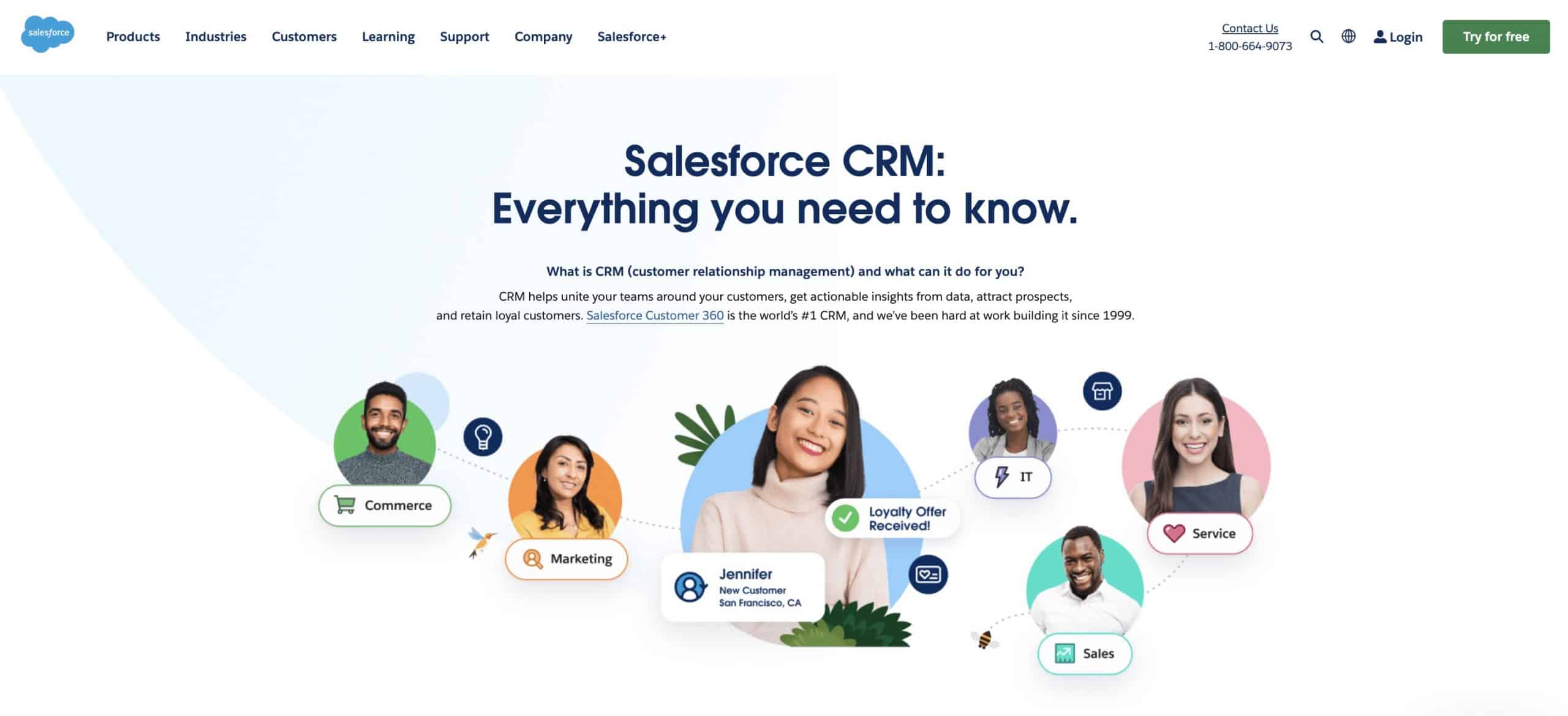
Salesforce is a leading CRM platform that integrates sales, customer service, marketing, and commerce into one powerful solution. Known for its scalability and flexibility, Salesforce provides a 360-degree view of customer interactions, empowering businesses to strengthen relationships and boost productivity. Its AI-powered tools, including Sales Cloud and Marketing Cloud, allow teams to engage clients with data-driven insights and personalized experiences across channels.
Salesforce is designed for businesses of all sizes and can be tailored to industry-specific needs, whether in retail, healthcare, or finance. With its vast marketplace, AppExchange, users can find additional applications to further enhance the CRM’s functionality. The platform also supports advanced automation and integration, ensuring that all aspects of customer management are streamlined and accessible to relevant teams.
For those interested in trying Salesforce, a 30-day free trial is available. However, pricing details are not directly listed on the site; instead, Salesforce encourages prospective users to contact their sales team to discuss specific needs and get a customized quote.
6. Zoho CRM
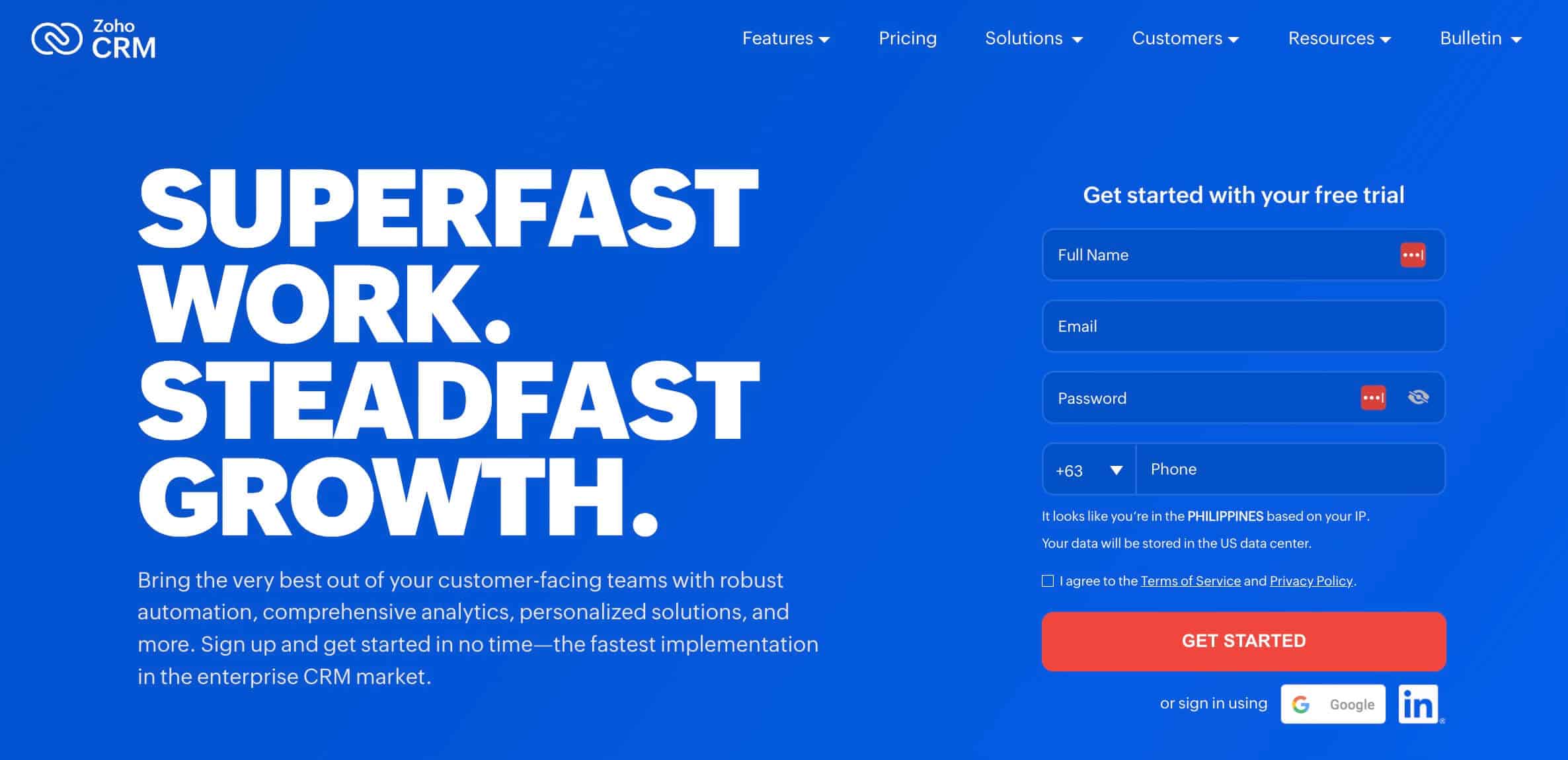
Zoho CRM is a flexible CRM platform popular for its ease of use, comprehensive features, and affordability. Designed for businesses of all sizes, it offers a 360-degree view of customer interactions, helping teams streamline sales, marketing, and support processes. Zoho CRM includes powerful tools such as journey orchestration, sales automation, and an AI assistant called Zia, which provides insights, predictions, and suggestions to help users make data-driven decisions.
The platform supports multi-channel communication, allowing teams to connect with clients via email, social media, and chat, all within a single interface. Zoho CRM also offers advanced customization options and a robust marketplace for integrations, enabling users to tailor the system to their specific needs. Its focus on privacy and security, with data storage in specified regions, is another strong point, especially for businesses that prioritize data protection.
Zoho CRM offers four pricing tiers: the free edition supports up to three users, while the paid plans—Standard ($14/user/month), Professional ($23/user/month), Enterprise ($40/user/month), and Ultimate ($52/user/month)—provide access to additional features such as advanced analytics, automation, and customization options. Zoho also offers a 15-day free trial for new users, allowing them to explore the platform’s capabilities before committing.
7. Zendesk Sell
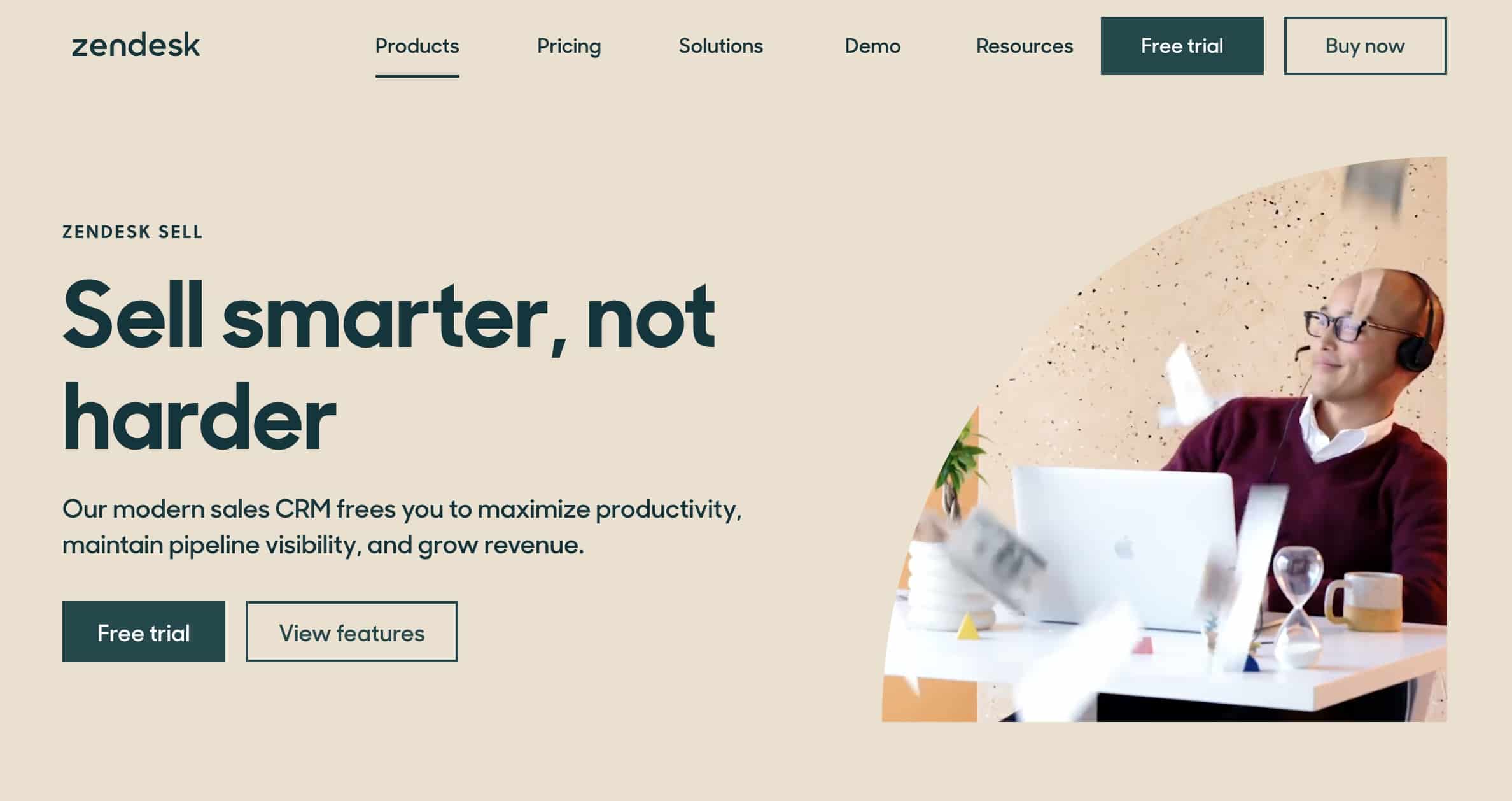
Zendesk Sell is a CRM solution built to boost sales productivity, visibility, and revenue growth. It centralizes essential sales tools like contact and deal management, lead generation, and activity tracking, making it easier for sales teams to stay organized and focused. With automated workflows and real-time data tracking, Zendesk Sell helps sales reps reduce busy work and stay on top of their sales pipeline.
One of Zendesk Sell’s strengths is its full customer view, providing teams with insights into each client’s journey. Integrated with the larger Zendesk platform, it enables seamless communication across sales and customer service channels, allowing reps to deliver a cohesive customer experience. With mobile support, email tracking, and customizable reports, Zendesk Sell enables teams to access essential data and respond quickly from anywhere.
Zendesk Sell offers a range of pricing plans, starting at $19 per agent per month for the “Sell Team” plan, which covers basic CRM functions. The “Sell Growth” plan, at $55 per agent per month, includes advanced forecasting and analytics. For larger teams, the “Sell Professional” and “Sell Enterprise” plans, at $115 and $169 per agent per month respectively, add deeper customization, automation, and lead scoring capabilities. A free trial is available, letting teams explore the platform before choosing a plan.
Choose Ahsuite for Your CRM Portal
Choosing the right CRM portal can make a big difference in how efficiently your team manages customer relationships and streamlines communication. From highly customizable platforms like Microsoft Dynamics 365 and Salesforce to versatile options like Zoho CRM and SuiteDash, each tool has unique strengths to fit a variety of business needs and budgets. Whether you need robust sales automation, advanced reporting, or a simple, integrated solution, this list provides a range of options to help your business stay organized and connected.
Among these choices, Ahsuite stands out for its simplicity and dual focus as both a CRM and a client portal solution. While it may lack some advanced CRM features, it excels in ease of use and provides essential CRM tools, including task management and secure file sharing, all within an intuitive, user-friendly portal. For teams seeking a streamlined solution that combines CRM functionality with a best-in-class client portal, Ahsuite offers a balanced, accessible option that makes managing client relationships straightforward and secure.Ready to give it a try? Sign up for a free Ahsuite account today and explore how its integrated CRM and client portal features can help streamline your business.
